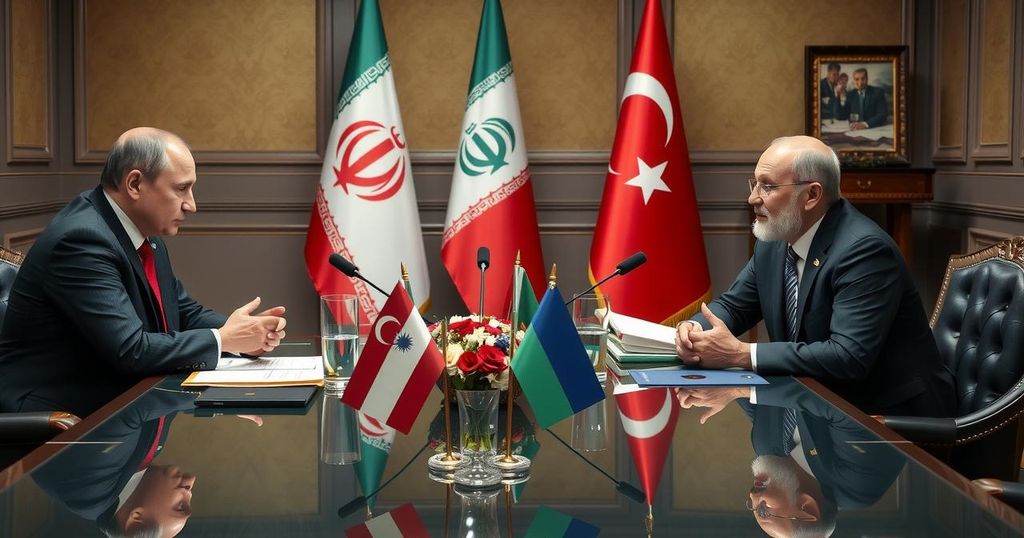World news
AGENCE FRANCE - PRESSE, ASIA, BASHA, BASHAR AL - ASSAD, CONFLICT, ERDOGAN, EUROPE, EUROPE/ASIA, FIGHTER JETS, HA, HAKAN FIDAN, HAMA, IRAN, MILITARY, REC, REUTERS, RUSSIA, SYRIA, SYRIAN CIVIL WAR, SYRIAN CONFLICT, SYRIAN NATIONAL ARMY, U. S. - BACKED SYRIAN DEMOCRATIC FORCES, UKRAINE, WAR
Lena Nguyen
0 Comments
Turkey, Russia, and Iran to Discuss Syrian Conflict Amid Rebel Advances
Turkey, Russia, and Iran are set to meet this weekend in Qatar to discuss the Syrian conflict’s evolving dynamics following a significant offensive by Islamist rebels. The meeting will occur during the Doha Forum and seeks to address political solutions amidst recent territorial changes and heightened tensions between competing forces in the region.
This weekend in Qatar, Turkey, Russia, and Iran are scheduled to convene for discussions regarding their strategic response to a recent offensive by Islamist rebels, which has significantly impacted the dynamics of the ongoing Syrian civil conflict. The meeting is set to take place during the Doha Forum, an event that promotes the exchange of ideas among global leaders and experts. Turkish Foreign Minister Hakan Fidan will engage with his Russian and Iranian counterparts to continue dialogues initiated under the Astana process, aimed at resolving the conflict politically.
The recent offensive by Hayat Tahrir al-Sham (HTS) has resulted in the capturing of Aleppo and advances towards Hama and Homs, marking a notable shift in control within Syria. Both Russia and Iran, allies of President Bashar al-Assad, are particularly focused on stabilizing the region, following previous successful negotiations that established ceasefires.
Turkish President Recep Tayyip Erdogan has signaled support for Syria’s territorial unity while underscoring the need for the Syrian government to actively seek political solutions to the ongoing issues. Turkish interests remain deeply tied to preventing the rise of Kurdish forces in the region, which are perceived as threats due to their connections to the PKK, a designated terrorist organization by the U.S.
Tensions are further complicated by the ongoing rivalry between Turkey-backed forces and U.S.-backed Syrian Democratic Forces (SDF). The U.S.’s involvement in Syria continues alongside its military operations against ISIS, aiming to suppress any resurgence of this terror group amidst the chaos of the civil war.
Amid shifting alliances and military strategies, the geopolitical implications of the conflict remain profound, with military leaders noting that neither Russia nor Iran are inclined to allow further loss of influence in the Middle East, given Syria’s strategic importance.
The delicate balance of power in Syria remains a pressing concern for regional and global stakeholders, particularly with the prospect of escalating conflict leading to greater instability in neighboring regions.
The complexities surrounding the ceasefire negotiations highlight the urgent need for diplomatic efforts to restore stability, especially considering the significant number of Syrian refugees residing in Turkey. An effective resolution may facilitate their return to Syria, underscoring the humanitarian implications of the ongoing conflict.
The Syrian civil war, having persisted for over a decade, has resulted in the involvement of multiple international players and significant shifts in alliances and territorial control. Initially, the conflict began with protests against Bashar al-Assad’s regime, escalating into a complex war involving various factions, including government forces, opposition groups, and extremist entities. The Astana process was initiated in 2017 by Turkey, Russia, and Iran to foster dialogue and establish ceasefires. Recent rebellious offensives have intensified the urgency for these nations to reconvene and reassess their strategies amidst changing battle lines and the potential re-emergence of ISIS.
In conclusion, the upcoming talks among Turkey, Russia, and Iran represent a pivotal moment in addressing the ongoing Syrian civil war. The recent advances by HTS have changed the military landscape, prompting urgent discussions on political solutions and stability. The interplay of regional security concerns, humanitarian crises, and geopolitical strategies highlights the complexities facing all involved parties. These negotiations may very well determine the future trajectory of the conflict and the peace prospects for Syria.
Original Source: www.voanews.com




Post Comment